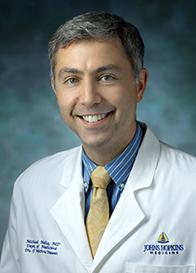
Michael Melia, MD – Fellowship Program Director
Dr. Michael Melia is an Associate Professor of Medicine in the ID Division. He has been the director of the Johns Hopkins ID fellowship training program since July 2015, after having served as the associate director beginning in January 2010. He served as Chair of the IDSA Training Program Directors’ Committee from October 2019 through October 2021. He is the current Vice Chair of the IDSA Medical Education Community of Practice and served as its IDWeek Workgroup Chair from 2019-2021. He is also an associate director of the Osler Medical Housestaff Training Program, focusing on faculty engagement and housestaff coaching.
Dr. Melia is a passionate educator and works with learners at multiple stages of training. He is clinically active in both the inpatient and outpatient arenas for both the “general infectious diseases” and HIV services. He spends the majority of his research efforts engaged in medical education research. His clinical research interests have included Lyme disease, Nocardia infections, and viral hepatitis. Melia Research Dashboard and Publications
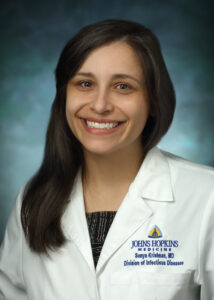
Sonya Krishnan, MD, MHS – Fellowship Program Associate Director
Dr. Sonya Krishnan is an Assistant Professor of Medicine in the ID Division. She is a proud graduate of both the Osler Medical Residency and ID Fellowship at Hopkins, and received her MHS through the Graduate Training Program in Clinical Investigation at the Bloomberg School of Public Health. She joined the ID Division as faculty in 2022 and is excited to partner with the ID fellows during their journey through training in infectious diseases.
Clinically, Dr. Krishnan enjoys providing outpatient HIV care and attends on the inpatient services for general ID. In addition, she is the Osler Associate Program Director for Ambulatory Experiences. Her research focuses on better understanding adverse treatment outcomes in people living with HIV and those with tuberculosis, both globally and locally.
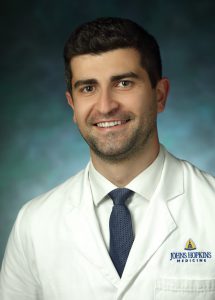 Mamuka Machaidze, MD – Fellowship Program Assistant Director
Mamuka Machaidze, MD – Fellowship Program Assistant Director
Dr. Mamuka Machaidze is an Assistant Professor of Medicine in the Division of Infectious Diseases at the Johns Hopkins University School of Medicine, as well as Assistant Director of the Infectious Diseases fellowship training program for Johns Hopkins Bayview Hospital. He earned his M.D. from the David Tvildiani Medical University (Tbilisi, Country of Georgia), completed an Internal Medicine Residency at Emory University and Infectious Diseases Fellowship at New York University Hospital.
Dr. Machaidze joined Hopkins faculty in 2019. He is passionate about working with residents and students during inpatient Infectious Disease consult service. His research interests are focused on Phage therapy for resistant pathogens, as well as Non-Tuberculous Mycobacteria. He is involved in the Medical Housestaff Education and percepts Internal Medicine Residents in the general ID clinic at Bayview outpatient clinic.
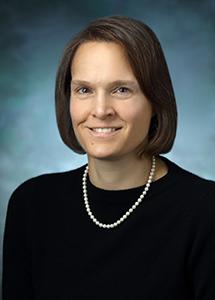
Sara Cosgrove, MD, MS, FSHEA, FIDSA – Chair of the Fellowship Research Review Committee & PI of the Fellowship Program T32 Grant (Research Training in Microbial Diseases); Medical Director of the Johns Hopkins Hospital Department of Antimicrobial Stewardship
Dr. Cosgrove is a Professor of Medicine and Epidemiology at Johns Hopkins University School of Medicine. She serves as the Chair of the Fellowship Research Guidance Committee and is the PI of the T32 Fellowship Training Grant, “Research Training in Microbial Diseases,” that is funded by the National Institute of Allergy and Infectious Diseases. Dr. Cosgrove is Medical Director of The Johns Hopkins Hospital Department of Antimicrobial Stewardship. Her research interests include epidemiology and outcomes of antimicrobial resistance, development of tools and programs to promote rational use of antimicrobials, prevention of hospital-acquired infections and epidemiology and management of S. aureus bacteremia. She is a voting member of the Presidential Advisory Council on Combating Antibiotic Resistant Bacteria and is a past-president of the Society for Healthcare Epidemiology’s Board of Directors.
Dr. Cosgrove’s research interests include epidemiology and outcomes of antimicrobial resistance, development of tools and programs to promote rational use of antimicrobials, prevention of hospital-acquired infections and epidemiology and management of S. aureus bacteremia. Cosgrove Research Dashboard and Publications

Joel Blankson, MD, PhD – Co-chair of the Fellowship Research Review Committee & Co-PI for the Fellowship Program T32 (Research Training in Microbial Diseases grant)
Dr. Blankson is a Professor of Medicine at Johns Hopkins University School of Medicine, Division of Infectious Diseases. Alongside Dr. Cosgrove, Dr. Blankson also serves as the Co-chair of the Review Committee and the Co-PI of the T32 Fellowship Training Grant, “Research Training in Microbial Diseases,” that is funded by the National Institute of Allergy and Infectious Diseases.
He is an expert on HIV infection, particularly HIV latency and long-term control of HIV infection. Dr. Blankson is a lead investigator in studies on these topics and is frequently interviewed in the scientific and popular press. He also practices internal and infectious disease medicine. Blankson Research Dashboard and Publications
Additional Core Faculty
Our division consists of more than 100 faculty members, many of whom work closely with our fellows on the wards and as research mentors. The following are examples of our wonderful faculty who are dedicated to nurturing the clinical skills and professional development of our fellows.
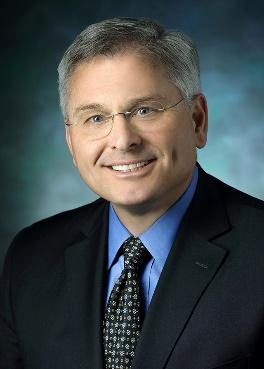
Paul G. Auwaerter, MD, MBA
Dr. Paul Auwaerter is the Sherrilyn and Ken Fisher Professor of Medicine at the Johns Hopkins University School of Medicine. Areas of particular clinical focus include tickborne diseases including Lyme disease, Epstein-Barr virus infections and fevers of unknown origin.
Dr. Auwaerter serves as the Clinical Director of the Division of Infectious Diseases. He is also the director of the Fisher Center for Environmental Infectious Diseases, the Executive Director for the Point of Care-Information Technology (POC-IT) Center and Editor-in-Chief of the Johns Hopkins Antibiotic Guide. He earned his M.D. from the Columbia University College of Physicians and Surgeons.
His research interests include tick-borne diseases and point of care information technology. Dr. Auwaerter serves on the Promotions Committee for the Johns Hopkins Department of Medicine. He was recognized with a Healthnetworks Service Excellence Award in 2014. He is a member of the American Society of Microbiology (ASM) and the Infectious Diseases Society of America (IDSA), serving as President of the IDSA 2017-2018. Auwaerter Research Dashboard and Publications
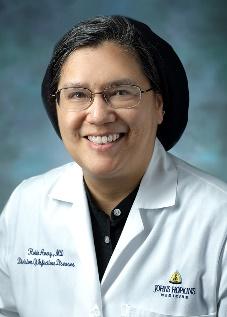
Robin Avery, MD
Dr. Robin Avery is an infectious disease physician who joined the Johns Hopkins faculty in 2012, with two decades of experience in transplant infectious disease. She is a past chair of the American Society of Transplantation (AST) Infectious Disease Community of Practice; was a co-editor of the first edition of the AST ID Guidelines; and has served on guidelines committees for the AST, the Infectious Disease Society of America (IDSA) and the International Society for Heart and Lung Transplantation (ISHLT), as well as the Centers for Disease Control and Prevention Zoster Vaccines Workgroup. She was the founding head of the Transplant Infectious Disease Section at the Cleveland Clinic and the founding director of the Cleveland Clinic Transplant ID Special Fellowship, authoring a curriculum that served as the basis for curricula later endorsed by the AST and IDSA.
Her clinical and research interests include pre-transplant donor and recipient evaluation, and prevention and treatment of post-transplant infections, particularly transplant-associated viruses, viral load monitoring, novel therapies for CMV, hypogammaglobulinemia, immunizations, patient education, and strategies for safer living post-transplant. In 2017, Dr. Avery received the award for Best Consulting Physician at the Johns Hopkins Hospital. Avery Research Dashboard and Publications

Kelly Gebo, MD
Dr. Kelly Gebo is a graduate of The Johns Hopkins University School of Medicine. She also earned an MPH in Epidemiology from The Johns Hopkins Bloomberg School of Public Health. She completed residency training in Internal Medicine at The Johns Hopkins Hospital followed by two years of fellowship training as a Robert Wood Johnson Clinical Scholar in the Department of Medicine, also at Hopkins. Her clinical and research interests include evidence based practice, health disparities in access to care, health utilization, HIV and aging, hepatitis, outcomes research, and policy generation.
Dr. Gebo is affiliated with The Johns Hopkins Center for Global Health, Reducing Global Inequities in Burden of Disease, where she has translated individual patient care to larger global health issues. As part of a multidisciplinary group in Baltimore, she has been closely involved with mentoring students interested in global health issues as it relates to infectious diseases. She worked closely with students engaged in research projects such as Cancer in the Hopkins HIV Cohort in the Era of HAART and the Impact of Illicit Drug Use and Substance Abuse Treatment on HAART Adherence. Her work with HIV in the Elderly Population was recently supported by an RO1 Research Grant from the National Institute on Aging, entitled “Clinical Outcomes in Elderly HIV Patients.” A pilot grant in 2003 provided funds for her to study National Trends in HIV+ Hospitalizations 1996-2000. In 2018, Dr. Gebo accepted a position as Chief Medical and Scientific Officer for the NIH All of Us Research Program where she will work with key stakeholders to lead the program’s scientific agenda, guide protocol revisions and data collection processes, and provide clinical oversight. Dr. Gebo has authored or co-authored more than forty-two publications. Gebo Research Dashboard and Publications
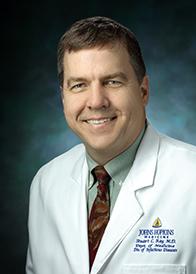
Stuart C. Ray, MD
Stuart C. Ray, MD, FACP, FIDSA serves as Vice Chair of Medicine for Data Integrity and Analytics and is a Professor in the Division of Infectious Diseases within the Department of Medicine, with secondary appointments in Viral Oncology and Health Sciences Informatics. He is Scientific Director of the JHU Laboratory for Integrated NanoDiagnostics, directs the virology laboratory and is a clinical investigator in the Center for Viral Hepatitis Research in the Division of Infectious Diseases. He is a faculty member of the Graduate Immunology program, the Graduate Pharmacology program, and of the Janeway Firm of the Osler Medical Service.
Dr. Ray received his M.D. from Vanderbilt University School of Medicine in 1990. After an internship and residency at Johns Hopkins Hospital, he continued there as an Assistant Chief of Service and fellow in Infectious Diseases. During his fellowship, he studied the immunology and sequence variation of HIV in the laboratory of Dr. Robert Bollinger. During that time, he developed an interest in HIV sequence variation during antiretroviral therapy in a productive collaboration with Dr. Robert Siliciano that continues to the present.
In 1997, Dr. Ray joined the Johns Hopkins faculty, and under the mentorship of Dr. David Thomas shifted his primary research focus to hepatitis C virus (HCV). His laboratory work has focused on the sequence variation of HCV during acute and chronic infection, developing and applying computational and molecular biology tools to underlying mechanisms including stochastic variation, immune selection, and viral fitness. He continues to care for patients with HIV, HCV, and other infectious diseases. Ray Research Dashboard and Publications
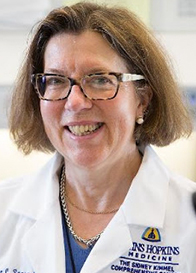
Cynthia L. Sears, MD
The Sears laboratory studies how the microbiota and specific bacteria induce colon carcinogenesis. We integrate studies in humans and mouse models (including germ-free mice) employing microbiology, bioinformatics and immunologic methods to seek to achieve our goals to understand disease mechanisms and to develop new approaches to disease prevention. We study the bacterium, enterotoxigenic Bacteroides fragilis (ETBF) as a model for inducing colon inflammation and carcinogenesis. Using in vivo murine models, we identified that ETBF contributes to colon tumorigenesis through secretion of BFT (B. fragilis toxin), activation of STAT3 and NF-κB as well as induction of mucosal IL-17. In humans, most colon cancer patients have evidence of ETBF colonization and nearly 50% of individuals with sporadic colon cancers as well as individuals with hereditary colon cancer display carcinogenic biofilms.
Active projects in the laboratory include determining the epidemiology of colon biofilm formation in a 2000 person prospective colonoscopy cohort; understanding how biofilms form on mucosal surfaces and induce disease; addressing mechanisms by which bacterial virulence factors induce carcinogenic DNA alterations; defining which microbiota members or communities induce mucosal carcinogenesis and IL-17; and identifying how the colon microbiome and its members impact cancer immunotherapy responses in humans. Sears Research Dashboard and Publications
 Amita Gupta, MD, MHS
Amita Gupta, MD, MHS
Dr. Amita Gupta is Director of the Division of Infectious Diseases at the Johns Hopkins School of Medicine. She is also Deputy Director of the Center for Clinical Global Health Education (CCGHE), Faculty Co-chair of the Johns Hopkins India Institute, and Professor of Infectious Diseases at the JH School of Medicine, with a joint appointment in International Health at the JH Bloomberg School of Public Health.
Board certified by the American Board of Internal Medicine in infectious diseases, Dr. Gupta specializes in international public health, clinical research, and education in infectious diseases, HIV/AIDS, tuberculosis (TB), and antimicrobial resistant infections. Since 2003, her work has been focused primarily on India, where she leads several Indo-JHU research collaborations. She serves in numerous leadership positions at the University, national, and international level; is an active clinical investigator in multi-country trials conducted by the AIDS Clinical Trials Group (ACTG) and the International Maternal Pediatric Adolescent AIDS Trials Network (IMPAACT); has been awarded research grants from the NIH, CDC, UNITAID, and several philanthropic foundations to investigate infectious diseases of importance to India and beyond; and is the author of more than 200 peer-reviewed research publications and nearly a dozen book chapters on prevention and treatment of HIV, TB, and other infectious diseases, primarily in low- and middle-income settings.
Dr. Gupta received her undergraduate degree from MIT, a Doctor of Medicine from Harvard Medical School, and a Master of Health Sciences in clinical investigation from JH Bloomberg School of Public Health. She completed her internal medicine training at San Francisco General Hospital-University of California, San Francisco. Gupta Research Dashboard and Publications

Susan A. Tuddenham, MD, MPH
Dr. Susan Tuddenham is an Assistant Professor of Medicine in the Division of Infectious Diseases, Johns Hopkins Bayview. She earned her M.D. from the David Geffen School of Medicine at UCLA, her M.P.H. from the Johns Hopkins Bloomberg School of Public Health, and completed an Internal Medicine Residency and Infectious Diseases Fellowship at the Johns Hopkins Hospital.
Her research interests are in Sexually Transmitted Infections (STI), HIV, and the human microbiome. She currently holds an NIH K23 award focused on the impact of hormonal contraception on dysbiosis and the vaginal microbiome, and smaller grants investigating the impact of HIV on the gut microbiome. She also maintains an outpatient HIV clinic, an outpatient ID and STI clinic, and attends on the inpatient services for general ID. Tuddenham Research Dashboard and Publications

Damani Piggott, MD, PhD
Dr. Damani Piggott is an Associate Professor of Medicine at the Johns Hopkins University School of Medicine and holds a joint appointment in epidemiology at the Bloomberg School of Public Health. He is the inaugural Associate Vice Provost for Graduate Diversity and Partnerships and the Director of the Vivien Thomas Scholars Initiative at Johns Hopkins University. He serves as the Co-Director of the Kennedy Krieger Institute James A. Ferguson Emerging Infectious Diseases RISE Fellowship Program, funded by the Centers for Disease Control and Prevention, and is a founding member of the Inclusion, Diversity, Access and Equity Task Force of the Infectious Diseases Society of America.
Dr. Piggot’s areas of clinical expertise include HIV and infectious diseases. He has worked on clinical and research projects in urban and rural communities in the United States, the Caribbean, West Africa, and South Africa. His research centers on understanding the biological, epidemiologic, and social determinant pathways necessary to improve survival and quality of life for persons aging with HIV, with particular focus on the investigation of frailty and other aging phenotypes. Piggott Research Dashboard and Publications
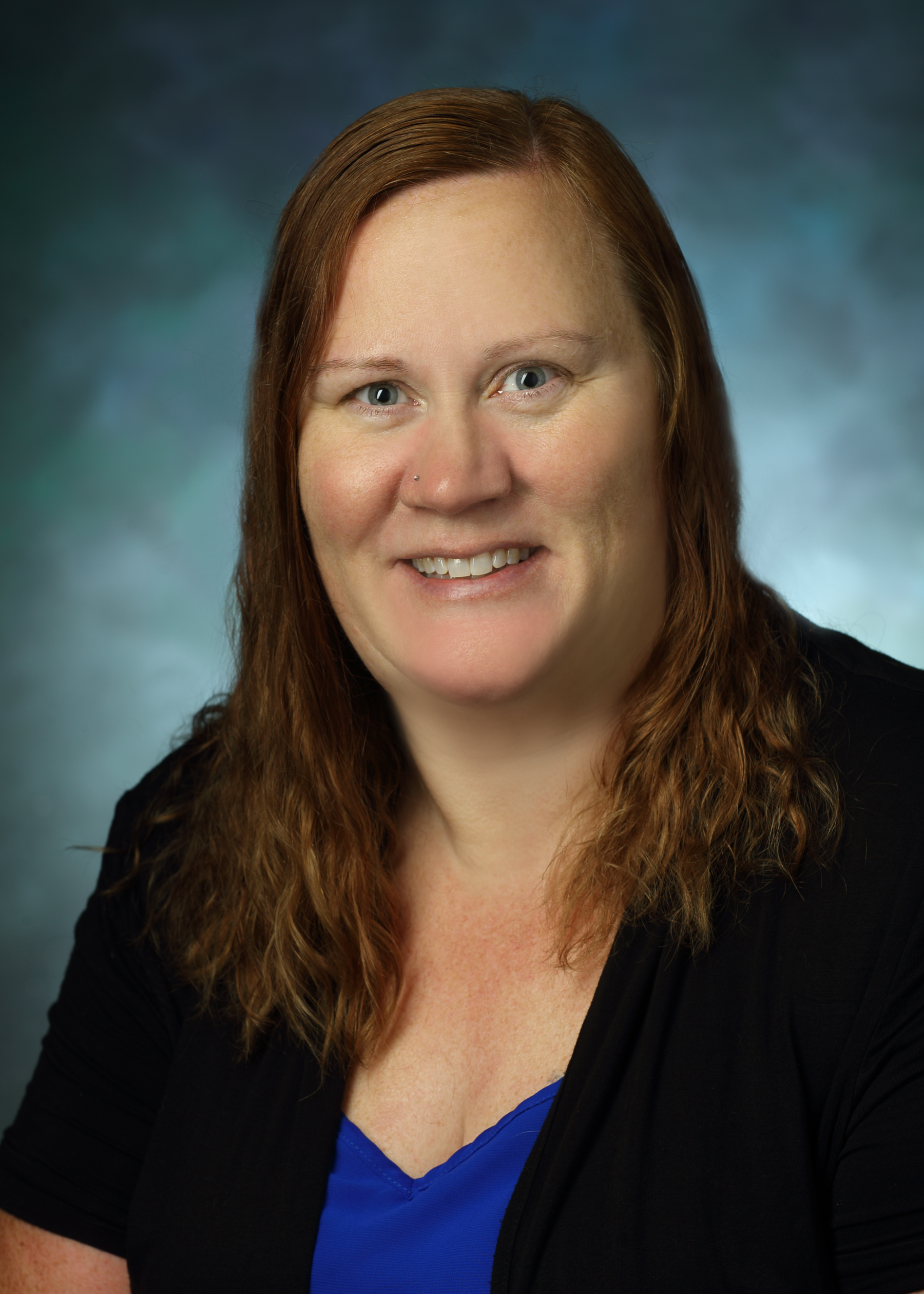 Shelly Sasser
Program Administrator
ACGME ID Fellowship
Shelly Sasser
Program Administrator
ACGME ID Fellowship